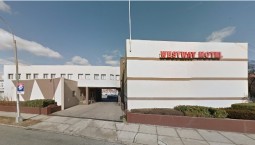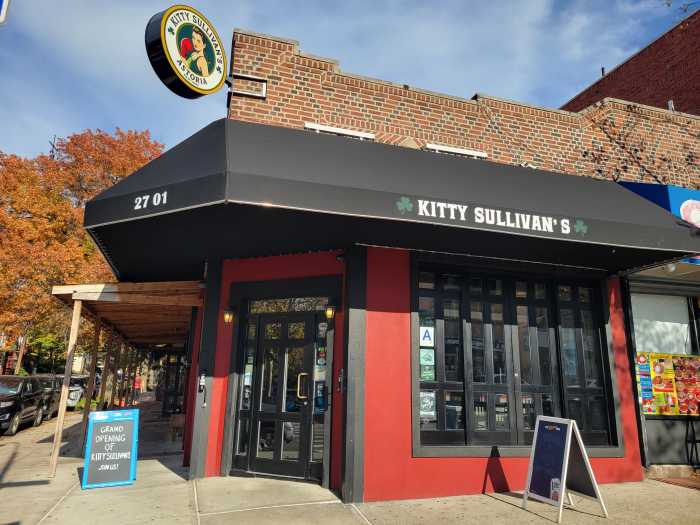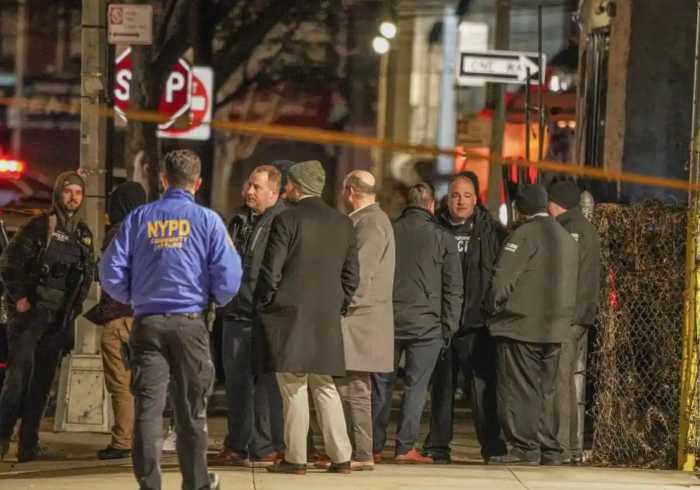 July 24, 2014 By Michael Florio
July 24, 2014 By Michael Florio
Hundreds of residents turned up at the Museum of Moving Image last night to voice their outrage about the opening of a 121-family homeless shelter at the Westway Motor Inn on Astoria Blvd.
Many residents claimed that they were caught off guard by its opening, and were concerned that the shelter would be a magnet for crime and would continue to stretch the neighborhood’s overcrowded schools.
While the Westway Motor Inn has acted as an overnight shelter in recent times, this is the first time the homeless will be staying on site long term.
A big issue for many was that the homeless would bring drugs and violence to the neighborhood.
One East Elmhurst mother said that she was afraid that her 15-year-old son would be exposed and pressured to use drugs. Another woman, Antonia Papadouris, who lives next to the shelter, said she has found hypodermic needles in her driveway and has noticed marijuana smoke coming from around the shelter.
Papadouris claimed that a teenager from the shelter pulled a knife on her father-in-law last Friday after he asked a group of teenagers to be quiet at around 11pm. However, the father of the teenager—who lives in the shelter–disputed this claim at the meeting.
Captain John Travaglia, with the 114th precinct, confirmed that a police report was filed on the matter but did not comment as to the validity of the allegation.
However, representatives of the Department of Homeless Services (DHS) tried to reassure the community that their safety would not be put in jeopardy.
They stated that shelter residents have to be inside the facility by 9 pm each night. Furthermore, the shelter is monitored—by security guards and surveillance cameras–to ensure that there is no criminal activity brought onto or off the site.
Bonnie Stone, CEO of Woman in Need (WIN), the social service group that put forward the proposal to bring the shelter to the area, said that there are always three security guards on site at any time.
Meanwhile, Lorraine Stephens, First Deputy Commissioner with DHS, said that those people who have security concerns should alert DHS–and that the agency would work to fix them.
But many attendees were not comforted by these statements.
Shouts of “you guys are crooks,” “liars,” and “no one respected us,” rang from the audience throughout the night.
Rose Marie Poveromo, president of the United Community Civic Association, which organized the meeting, often had to ask the crowd to quiet down and show respect. Two men, in separate instances, got so outraged that they had to be escorted out of the building.
Another hot button issue dealt with schooling– and where the children from the shelter would go.
The shelter currently houses 129 children. Of that number, DHS said that 40 percent range from 1-to 5-years in age; 39 percent are from ages six through 12; with 21 percent being from 13 to 17 years of age.
The children who are from ages 1 to 5 years will be educated at a day-care center located at the shelter. Meanwhile, the 13-17 year olds will continue to go to the schools where they are currently enrolled throughout the city.
However, the children between 6 and 13 years are likely to go to public schools in the neighborhood. “We estimate that seven to eight children per grade will find places in the schools in this community,” Stone said.
But residents felt that this number was too high and that it would put pressure on the neighborhood’s overcrowded schools. They complained that the schools are already too stretched.
Some residents thought the whole concept of a shelter was a big waste of money after they were told that it costs about $100 a day to house a family.
“Wouldn’t it be easier to pay their rent?” said one man.
One resident complained that taxpayers have to foot the high tab and asked whether the shelter was just for US citizens or legal immigrants. When the DHS refused to answer, many in the crowd were upset.
“I think you got your answer, Sir,” Poveromo said.
The community as well as local politicians—from Councilman Costa Constantinides, Assemblywoman Aravella Simotas, State Senators Jose Peralta and Mike Gianaris—wanted to know how the DHS was able to convert Westway Motor Inn into a more permanent shelter without notifying anyone.
The hotel previously offered one-night services, but transformed into a long-term shelter on July 8th, without alerting the community or officials.
However, the DHS claimed that it was forced into creating a “[long-term] emergency shelter” since the number of homeless families in New York City has grown significantly in recent times. Furthermore, the DHS claimed that it was running out of spaces for homeless families to go.
 The DHS, according to officials, is able to operate the shelter in its present form for up to six months. To continue to operate past that period, it would need the community’s approval.
The DHS, according to officials, is able to operate the shelter in its present form for up to six months. To continue to operate past that period, it would need the community’s approval.
“If they want to extend [the shelter] past six months they have to go through a process, and different agencies, including a public hearing,” said State Sen. Jose Peralta.
However, the local politicians are trying to nip it in the bud now—before it starts going through the process.
“This is being shoved down our throat whether we like it or not,” Assemblywoman Simotas said. “We are not going to stop until we hold people accountable; that is the promise I make.”
Simotas said that they will try to stop it from becoming a permanent shelter.
The politicians have already sent a letter to the Commissioner of DHS Gilbert Taylor expressing their concerns.
Camille Rivera, Deputy Commissioner with DHS, said the agency had received the letter and is working on a response.
However, Rivera asked for people to be more compassionate.
“These are people who are coming to us at the lowest point of their lives, in need of help,” Rivera said. “I understand that there is a lot of nervousness and fear from the community, and we want to work with you to create a plan.”
Nancy Silverman, an Astoria resident and community board member, stated that many residents are in favor of the shelter.
“We are all one, or a couple of paychecks, or one accident away from being homeless,” she said. “We understand it is difficult for communities when a shelter comes in, but it has to go somewhere.”


































